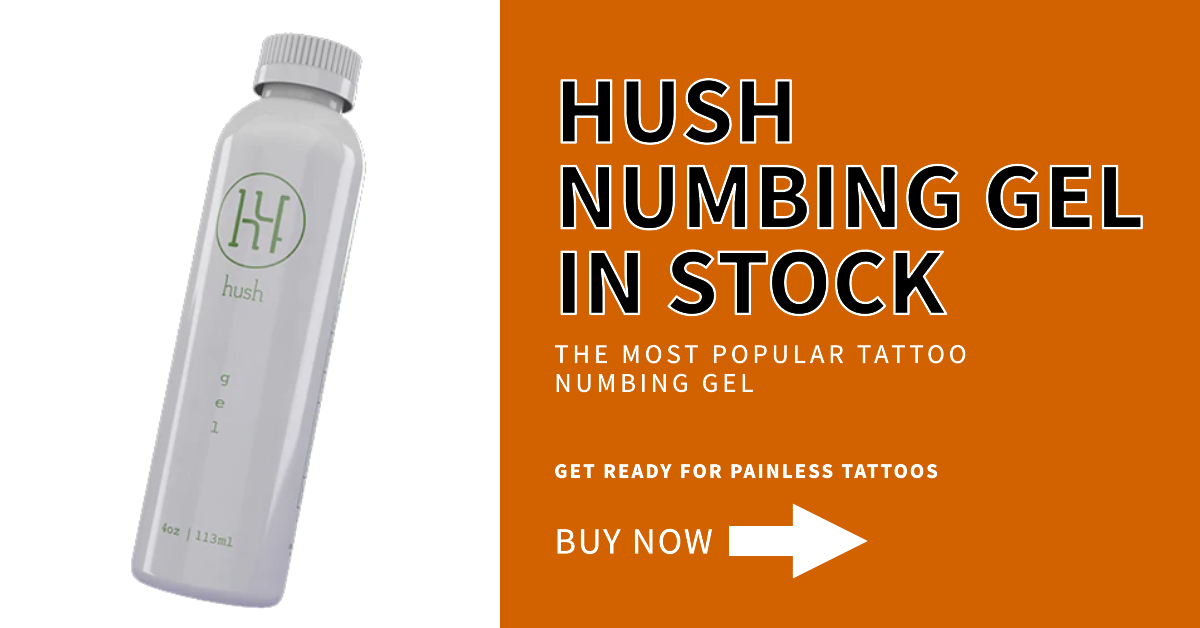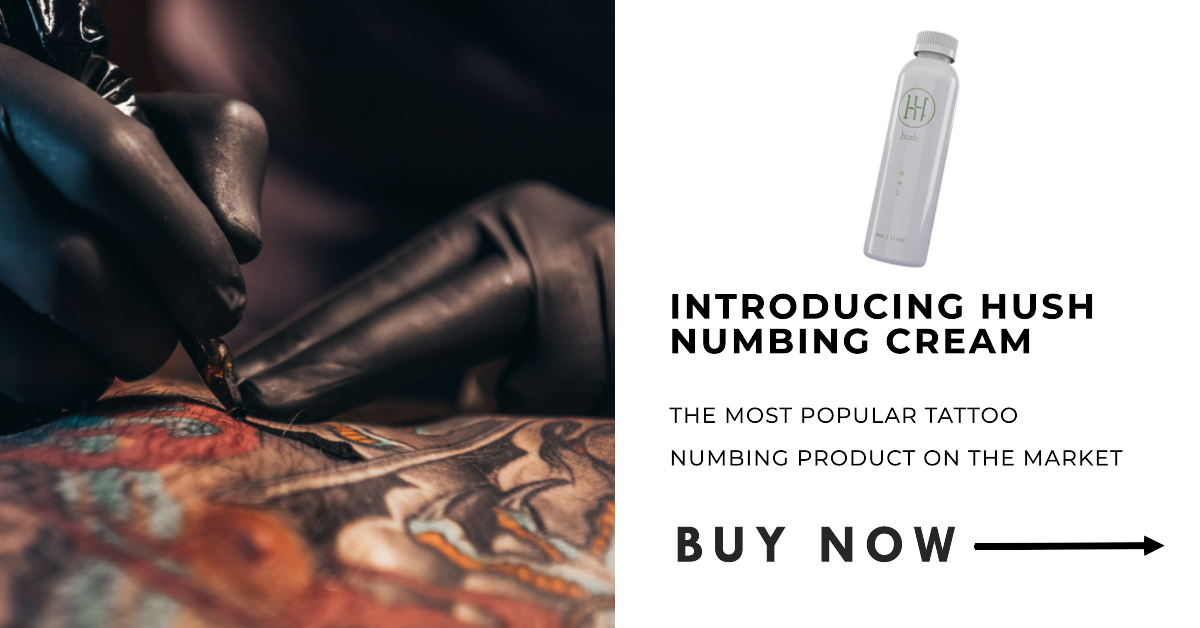Numbing Creams for Tattoos: How They Work and How to Use Them
/Also known as a topical anesthetics, these products are usually sold as creams or gels that are applied to the skin to provide relief from the sensation of pain and associated anxiety. It can be used for a variety of reasons, such as numbing the area before a tattoo is done, reducing pain during childbirth, or relieving pain from a sunburn.
Tattoo numbing creams works by using nerve blockers to block the transmission of nerve impulses to the brain, which reduces or eliminates the sensation of pain.
Whether its your first tattoo or you're an old pro, If you're considering getting tattooed and you have a low pain tolerance, using topical anesthetics can help to make the experience much more comfortable. In this article, we'll discuss how these products work and how to find the best tattoo numbing cream. Let's go!
What is Tattoo Numbing Cream and How Does it Work?
Topically applied nerve blockers are a type of anesthetic that is used to reduce the sensation of pain. It works by blocking the transmission of nerve impulses to the brain, which reduces or eliminates the sensation of pain. Tattoo numbing cream comes in various formulations, including creams, gels, and sprays. It can be used for a variety of reasons, such as numbing the area before a tattoo is done, reducing pain during childbirth, or relieving pain from a sunburn.
Using nerve deadeners can make the experience of getting a tattoo much more comfortable and less intimidating. Well formulated products may even help to speed up the healing process!
When looking for a pain killing product, it's important to find one that is effective and safe. Some productss contain ingredients that can irritate the skin or cause an allergic reaction. It's important to do your research and choose a formula that is right for you.
What Are The Different Types of Numbing Cream?
There are a few different types of nerve deadeners available on the market. The most common types are creams and gels which use lidocaine as the main active ingredient. These products are applied externally using a tongue depressor, a gloved hand or a Q-tip. Do not use your bare fingers! Gels tend to be thicker than creams and are easier to apply. Sprays are the least common type and they are sprayed directly onto the skin.
Lidocaine is a topical anesthetic that is used to numb the skin. All topical anesthetics work by blocking the nerve signals that send pain signals from the upper dermis to the brain. Other types of active ingredients for these products include benzocaine and tetracaine. Many over the counter formulas use a combination of these ingredients.
If you are getting a tattoo, it is important to choose a product that is specifically designed for use during the tattooing process. It is also important to follow the instructions on the packaging carefully, as over-application can cause contact dermatitis.
If you are looking for a good pain blocking product, here are some recommendations:
1. Tattoo Numb: This cream contains lidocaine, benzocaine, and tetracaine, and it is specifically designed for use on tattoos. It helps to anesthetize the skin and reduce pain and discomfort during the tattooing process.
2. HUSH: Our personal favorite! This cream contains lidocaine, prilocaine, and tetracaine, and is also specifically designed for use in tattooing. It also contains natural extracts which sooth and cool the skin and help to jumps start the healing process after the tattoo is done.
3. Numb 520: This cream contains lidocaine and tetracaine, and it is specifically designed for use on piercings.
When using any substance to deaden the nerves for a tattoo session, it's important to follow the manufacturer's instructions carefully. Be sure to apply it in a thin layer and avoid getting it in your eyes or mouth. Do not leave it on for longer than recommended, as this can cause dermatitis or other reactions.
Once you've applied the cream, wait for it to take effect. This usually takes about 30 minutes to an hour. You'll know it's working when the area feels numb or tingling.
How to Find the Best Numbing Cream for Tattoos
It's important to choose a product that is safe and effective and appropriate for the application you want to use it for. Personal preference might play a role so you may want to test out a few. Here are a few things to keep in mind when shopping for the right choice.
Make sure the product is FDA-approved.
Read the ingredients list. Make sure the cream contains lidocaine or prilocaine. These are the two most common types of anesthetics used.
Choose a cream that is fragrance-free and has a low concentration of anesthetic (between 2-4%). This will help reduce the risk of negative reaction.
If you're not sure which product to choose, ask your tattoo artist for recommendations. They will likely have experience with various types of formulas and can recommend a product that is best suited for your needs.
Know your own medical history before using any product that can affect your ability to sense pain.
Some companies may offer samples. it is a good idea to try a small test patch on your skin to be sure you wont have a contact dermatitis reaction.
Does numbing cream work immediately?
Yes, these substances begin working immediately but it does take some time to reach full effect. This is why it is so important to apply it ahead of time, so that the product has reached maximum potency on your skin just as you are starting to get tattooed. Some people find that these topically applied substances makes the tattoo process a lot less painful. Others find that it doesn't make much of a difference.
It is important to apply it in a thin layer and avoid getting it in your eyes or mouth. Do not leave it on for longer than recommended, as this can cause irritation or an allergic reaction.
What Are The Benefits of Using Numbing Cream for Tattoos?
Obviously the main benefits of using an anesthetic is that it helps to reduce the amount of pain you feel during the process. This can be especially helpful for people who are apprehensive about getting a tattoo because they are worried about how much it will hurt. Using a pain killer can help to calm those nerves and make the experience a bit more bearable.
Another benefit of using these products is that a good formula might contain extracts that work to soothe the skin and jump start the tattoo healing process.
What Are the Side Effects of Numbing Cream for Getting Tattooed?
While numbing agents can help to make the experience of getting a tattoo less painful, it is important to be aware of the potential health risks of over the counter products. Some potentially dangerous side effects of these substances include:
Rashes or itchiness
Allergic reactions
Numbness in the area where the cream was applied
Dizziness
Headache
Nausea
If you experience any of these side effects after using numbing cream, be sure to contact a healthcare provider immediately.
Numbing creams also have a limited time when they are working effectively. Some people have reported that once the effects of the numbing agent wore off, their body was actually more sensitive. This could be psychosomatic more than an actual physiological reaction but ultimately it doesn’t matter if the effect is the same either way!
Be aware that for longer sessions, you may need to reapply but reapplication comes with more risk of reaching toxic levels in your blood. Always follow directions on the product very carefully! It is vitally important that you treat these substances with respect and use them responsibly.
Another potential side effect of numbing cream is that it can cause your skin to become dry and irritated. If this happens, you may need to stop using the numbing cream and switch to a different product.
Some tattoo artists have reported that they do not like numbing creams because it can affect the feel of the flesh, making it harder to apply the tattoo. This probably has more to do with the product and many newer formulas have solved this problem.
Overall, numbing cream is a safe and effective way to reduce pain during and after your tattoo. However, there are some potential side effects that you should be aware of. Make sure to talk to your tattoo artist about any concerns you have before using numbing creams.
Precautions to Take When Using Numbing Creams for Tattoos
When using topical nerve blockers during the tattoo process, it is important to take precautions to ensure that you stay safe and healthy. Here are some tips for using these products safely:
Read the instructions on the product carefully and follow them to the letter.
Do not use numbing agents if you have any allergies to its ingredients.
Do not use these products if you are pregnant or breastfeeding.
Do not use if you have pre-existing liver conditions.
Do not use on areas that are larger than what is recomended by the product directions.
Do not use prescription numbing agents with high percentages of active ingredient.
Do not use in combination with vasoconstrictor
If you have any concerns about using numbing creams or medical conditions please consult a doctor prior to purchasing and applying anything to your skin.
What happens if you leave a topical anesthetic on too long?
If you leave tattoo numbing creams on too long, you may experience irritation or a rash. Applying too much or covering too large an area, could lead to dizziness, nausea, increased heart rate or headaches. If you experience any of these side effects, be sure to contact a physician immediately.Conclusion
Topical anesthetic products are a safe and effective way to reduce pain during and after your tattoo. However, there are some potential side effects that you should be aware of. Make sure to talk to your tattoo artist and your doctor about any concerns you have. Follow the precautions listed above to ensure that you use the product safely and effectively.
Conclusion
Topical anesthetic products are a safe and effective way to reduce pain during and after your tattoo. However, there are some potential side effects that you should be aware of. Make sure to talk to your tattoo artist and your doctor about any concerns you have. Follow the precautions listed above to ensure that you use the product safely and effectively.































